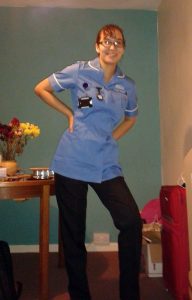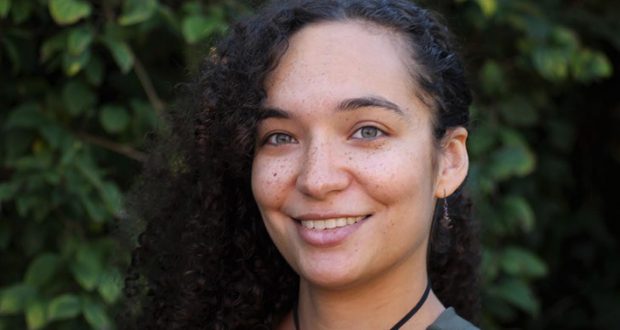Ella Berry’s body cannot cope with gravity – what she calls “Spaceman Syndrome” has devastated her life and destroyed her nursing career.
Yet she is determined to make the most of every day and use her experiences to raise awareness of ‘invisible illnesses’ like hers.
Ella had only been out of university a year and was on the path to becoming a sister when she was struck down by the condition officially known as Postural Tachycardia Syndrome (PoTS).
It means whenever she stands there’s a drop in blood supply to her heart and brain and her heart races to compensate – something that strikes astronauts when they return to earth until their bodies readjust to gravity pulling their blood downwards.

Proud Ella in nurse’s uniform.
Ella (23) said: “The main thing for me is remaining positive. If this is something I have got to live with for the rest of my life then I am going to live with it, not stop living because of it.”
It was toward the end of her nursing degree that, after a lifetime of being prone to fainting, Ella saw a cardiologist. She’d collapsed several times on work placements and, having tried to put it down to the heat on the wards or even perhaps a sudden aversion to blood, she was told PoTS was the probable cause.
She tried to carry on, following advice to manage her symptoms, graduated and moved to Birmingham with partner Allan Taylor, whom she met at Spalding High School sixth form. But working on a busy respiratory ward was leaving her exhausted and unwell. Then one day Allan came home to find her in bed, struggling to breathe and in terrible pain. He dialled 999.
Ella said: “I honestly thought I might die. From A&E I rang my mum and was trying to say goodbye on the phone. There was a part of me wondering if I was overreacting, but I also kind of knew I wasn’t.
“I just kept telling Allan and my mum I loved them. I knew the last thing I wanted to come out of my mouth was ‘I love you’.”
Initially, doctors put Ella’s symptoms down to a panic attack and she was discharged, but after a week at home where she could barely move she was admitted again.
Monitors revealed her pulse was rising so high each time she simply stood that she was at risk of heart attack. Ella was warned that without a cure, she may never be able to walk again.
Ultimately, doctors realised her blood volume had fallen dangerously low and intravenous fluids proved a massive help. She was discharged and prescribed beta-blockers to decrease the activity of her heart, but Ella was a shadow of her former self.
Unable to bath without help, brush her own hair or climb stairs, she abandoned her plans to move to London with Allan and instead moved back in with her mum Fay in Spalding.

Graduation day at University of Nottingham for Ella, with parents Martin and Fay Berry.
Ten months on, Ella is improving but knows her life is never likely to be the same again. Ella is prone to fatigue, palpitations, sweating, nausea, fainting and dizziness. The syndrome has also affected her memory and cognitive function leaving her unable to think straight at times.
She said: “It feels like my stamina went from 100 per cent to ten per cent and now maybe it’s at 40 per cent.
“That’s a massive adjustment to what I used to be and I know I can’t be like that anymore. There’s no way I could run around a ward for maybe 56 hours a week – I wouldn’t even make it through the first half a shift.
“I’m so different I even wondered if it was fair to Allan to still be with him, but he has been so supportive.”
Determined to find purpose, she has taken a string of online courses and taken up volunteering.
She said: “Everything is just at my own pace, sometimes I end up in bed all day – that probably happens at least once a week or perhaps it’ll be for a whole week. I just have to take one day at a time.
“It’s an invisible illness – you look at me and you’d never know anything was wrong, which is something I am keen to highlight to people.

Ella and Allan
“When people look at me on the train and judge me for not giving up my seat I’m thinking ‘I can’t!’
“And others seem to think I’m just making it up. I’m not sure why they think I would have wanted to throw my whole life away to live on benefits with my parents, but some do seem to think so!”
Ella has launched her own website (www.spacemansyndrome.strikingly.com) to share her experiences and wants to reach out to the medical profession in a bid to help with research into PoTS.
She said: “I’m not going to say I haven’t struggled with my diagnosis, but in a way it has freed me because when I was nursing, although I loved it, I used to moan because I was constantly exhausted. Now I’m just happy to be here.”
 The Voice of Spalding and South Holland
The Voice of Spalding and South Holland


